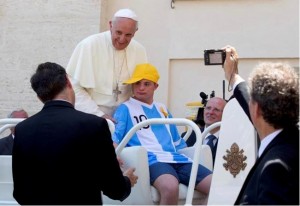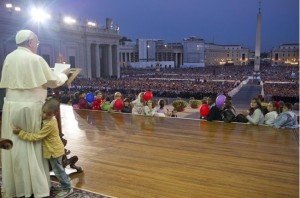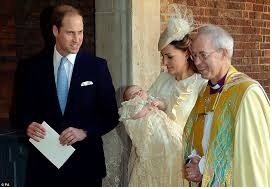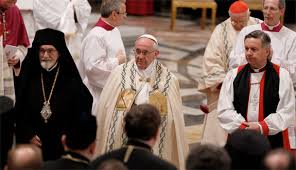The joy of good preaching is like a Mother sharing with her children:
Posted by SociusJan 30
In “The Joy of the Gospel” of Pope Francis, there is a section about preaching (sections 134-159). Pope Francis writes the most interesting things which are all for priests. At our Word of Life meeting last Monday, Liliana O Hagan, an Italian lady who comes to us from Eccleston, shared with us her enthusiasm for what Pope Francis says at Mass, or at the Angelus (when 90,000, and more, are present in St. Peter’s Square) or on various occasions. She can listen, of course, directly in Italian and it is easy to find the Padre Pio website, or that from Pompeii, or the Vatican website itself, where anyone can find video footage of what Pope Francis has most recently said. I have on the IPad, that was given me by the St Mary’s Leyland High School, “The Pope App”, and that has the Pope in English, as well as Italian. Luckily Italian is one language I can converse in, and read, so I too can listen to Pope Francis directly. His mother tongue is Spanish, but he speaks a very good Italian, being born into an Italian Argentine family.

Pope Francis with a Down Syndrome Child in his Popemobile
He certainly practices what he writes about; in “The Joy of the Gospel” (sections 139-140), we read something tender and beautiful about preaching:
The Church is a mother, and she preaches in the same way that a mother speaks to her child, knowing that the child trusts that what she is teaching is for his or her benefit, for children know that they are loved. Moreover, a good mother can recognize everything that God is bringing about in her children, she listens to their concerns and learns from them. The spirit of love which reigns in a family guides both mother and child in their conversations; therein they teach and learn, experience correction and grow in appreciation of what is good. Something similar happens in a homily. The same Spirit who inspired the Gospels and who acts in the Church also inspires the preacher to hear the faith of the God’s people and to find the right way to preach at each Eucharist. Christian preaching thus finds in the heart of people and their culture a source of living water, which helps the preacher to know what must be said and how to say it. Just as all of us like to be spoken to in our mother tongue, so too in the faith we like to be spoken to in our “mother culture,” our native language (cf. 2 Macc 7:21, 27), and our heart is better disposed to listen. This language is a kind of music which inspires encouragement, strength and enthusiasm.
Pope preaching with a young boy clinging to him.
This setting, both maternal and ecclesial, in which the dialogue between the Lord and his people takes place, should be encouraged by the closeness of the preacher, the warmth of his tone of voice, the unpretentiousness of his manner of speaking, the joy of his gestures. Even if the homily at times may be somewhat tedious, if this maternal and ecclesial spirit is present, it will always bear fruit, just as the tedious counsels of a mother bear fruit, in due time, in the hearts of her children. (The Joy of the Gospel, 139 – 140)
To me, our “Mother Culture” would mean our English way of doing things. I came across a beautiful homily preached by the Archbishop of Canterbury. Justin Welby. last Sunday in Sandringham, in the presence of the Queen and the Duke of Edinburgh. I reproduce a little of it below to give a flavour of it.
Archbishop Justin Welby with the Young Royals.
Usually unseen, churches of all sorts love and serve with vigour and passion, and while doing so are clear about their faith in Christ that motivates their action. That motivation starts for all of us with prayer, and also for the church as a whole with a renewal of what is called Religious life. Unless we are deeply prayerful and full of love from and for Christ, we are rotary with a pointy roof. Rotary is good but we are a church. In prayer we meet Christ, we listen first (St Benedict starts his Rule with the word “listen”), and are forgiven, renewed, empowered, directed, comforted.
The Religious or monastic life has been the bedrock of the church since the fourth century. Christians living in communities, in different ways, with the aim of encouraging a closer walk with Christ, have set the pace for all Christians everywhere. This last week we have begun a Religious community at Lambeth Palace, from a Catholic religious order called Chemin Neuf. They are ecumenical and modern, traditional and disciplined, they will hold us to our commitment to prayer.
Secondly, the church must learn good disagreement. Christians will never all agree on everything, they never have. That is true for the Church of England, let alone the Anglican Communion in 145 countries. Christ does not command unanimity, but love and unity in diversity. St Paul says God reconciled us to Himself when we were his enemies.
So we must be reconciled to each other in love. The command of love, even for enemies, flowing out of God’s reconciling love for us, is hard. In South Sudan and the Great Lakes region of Africa this coming week, my wife and I will see it at its hardest. But it is the Anglican Archbishop of the Sudan who is leading the work there, and his equivalents across the region, setting the example of courageous love. That is what has distinguished Christians across the centuries.
So as individuals and the church we need to be reconciled to God through Christ, to each other in the church, and to be reconcilers in all sorts of conflict from domestic and local to multinational. How we do that is varied and complex, but above all it is by action in the love of Christ and the power of His Spirit – not in fine words alone.
Thirdly, we must renew our confidence in proclaiming the good news of the love of Christ for every human being. Making disciples is at the heart of our mission. We must not be ashamed of talking about numbers, or of making the effort to speak of as well as show the good news of Jesus Christ.
Pope Francis on the day before the Sandringham sermon had preached on Church unity at St. Paul’s outside the walls in Rome to an ecumenical audience: he said this:
Paul appeals to the Christians of Corinth “by the name of our Lord Jesus Christ” to be in agreement, so that divisions will not reign among them, but rather a perfect union of mind and purpose. The communion for which the Apostle pleads, however, cannot be the fruit of human strategies. Perfect union among brothers and sisters can only come from looking to the mind and heart of Christ (cf. Phil 2:5). This evening, as we gather here in prayer, may we realize that Christ, who cannot be divided, wants to draw us to himself, to the sentiments of his heart, to his complete and confident surrender into the hands of the Father, to his radical self-emptying for love of humanity. Christ alone can be the principle, the cause and the driving force behind our unity.
“Let us pray that he will help us on this path, on this path of unity and of love, as we advance towards unity”. Unity will not come about as a miracle at the very end. Rather, unity comes about in journeying; the Holy Spirit does this on the journey. If we do not walk together, if we do not pray for one another, if we do not collaborate in the many ways that we can in this world for the People of God, then unity will not come about! But it will happen on this journey, in each step we take. And it is not we who are doing this, but rather the Holy Spirit, who sees our goodwill.
Pope Francis with ecumenical representatives
Dear brothers and sisters, let us ask the Lord Jesus, who has made us living members of his body, to keep us deeply united to him, to help us overcome our conflicts, our divisions and our self-seeking; and let us remember that unity is always better than conflict! And so may he help us to be united to one another by one force, by the power of love which the Holy Spirit pours into our hearts (cf. Rom 5:5). Amen.
Father Jonathan




No comments